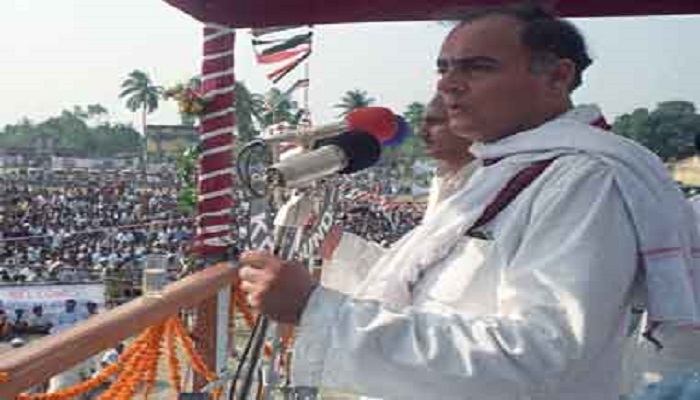
The Supreme Court on Thursday decided to hear the government on the conspiracy and making of the belt bomb that killed former Prime Minister Rajiv Gandhi in May 1991 at Sriperumbudur in Tamil Nadu.
The court is considering the plea by one of the convicts in the case, A.G. Perarivalan, who was found guilty of supplying a nine-volt battery for the bomb.
Perarivalan has suggested a larger conspiracy behind the assassination. His counsel, advocate Gopal Sankaranarayanan, has poked holes in the prosecution version that the makers of the bomb, who were resourceful enough to get hold of high-grade explosives and other complex parts of the IED, would have actually depended on Perarivalan to buy a battery for the bomb.
A Bench of Justices Ranjan Gogoi and Naveen Sinha observed that the court would hear only on the point of an alleged larger conspiracy behind the making of the IED. It has scheduled a hearing next Wednesday.
“Only that point concerns you (Perarivalan),” Justice Gogoi observed.
The court refused to look into other points pressed by Perarivalan, including the possibility of an “international conspiracy”, saying all that is a “closed chapter for you”.
The hearing was based on a sealed cover report submitted in court.
Perarivalan has alleged that there has not been an effective probe into the “larger conspiracy” behind the 1991 killing of the national leader. He has claimed that an “effective and straight-forward investigation may bring material contrary to the prosecution case”.Perarivalan, who is lodged in the Vellore Prison in Tamil Nadu, claimed that he has spent 25 years in prison, and has every right as a citizen to seek that a proper investigation is carried out in the assassination of late Prime Minister Rajiv Gandhi.
Appearing for CBI, Additional Solicitor General Maninder Singh had in the previous submitted that the probe is prolonged because there are several difficulties, including the fact that many of the suspects are absconders and outside the country, and so they require to be extradited first.
To this, the Bench said the probe has to be completed and if there is any benefit accruing to the petitioner (Perarivalan) from the result of the enquiry, he should surely get it.
The story of the ‘larger conspiracy’ angle started in 1998 when the Justice M.C. Jain Commission of Inquiry (JCI) recommended further probe into “various conspiracies behind the assassination of Rajiv Gandhi”.
After placing the recommendation before the parliament, the government set up a Multi Disciplinary Monitoring Agency (MDMA) in the CBI to follow up on Jain Commission’s work.
In July 1999, the designated TADA Court allowed the MDMA to probe the larger conspiracy angle. However, in 2013, Perarivalan complained to the TADA Court that the probe was both “feeble and pandering”. But the TADA court dismissed the plea.
A subsequent appeal in the Madras High Court to direct the TADA Court to effectively monitor the investigation was not entertained in 2015. He claimed that the TADA court had not even deemed it necessary to open the several probe reports filed before it in sealed covers.
In his petition before the Supreme Court, Perarivalan condemned the almost two-decade-long CBI investigation, which he said was cloaked in secrecy.
“It is imminent to state that the persons benefited from the assassination would be powerful and the suspects/accused may be one among them. All these aspects cannot be based on surmises and assumptions but has to be the outcome of a thorough Investigation. However, the CBI has only undertaken a namesake and feeble investigation so far in the left out aspects of the assassination case for the past 16 years,” Perarivalan said in the petition.
He claimed that CBI has more to conceal than to reveal and “is scared of the skeletons which may stumble out of their own cupboard”.
The petition said it was essential and expedient in the interest of justice that the investigation into the larger conspiracy be “strictly monitored” by the trial court or preferably by the High court till the investigation reaches its logical conclusion.

Post Your Comments